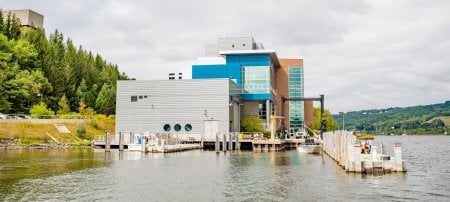Researchers across the Great Lakes are filling the winter sampling gap, heading out this month to better understand how winter influences lake ecology and health.
Michigan Technological University is among 14 U.S. and Canadian universities collaborating in the first Winter Grab, a coordinated sampling and data collection event to get a snapshot of what is happening in the winter and under the ice across all five Great Lakes and Lake St. Clair.

Most scientific sampling of the Great Lakes has taken place between May and October when the lakes are more readily accessible, leaving a major gap during the winter. But winter in the Great Lakes is important in influencing what happens during the rest of the year — for example, the amount of ice cover on Lake Superior influences summer water temperatures, which greatly affects biology in the lake year-round. The Winter Grab aims to fill this gap in year-round information to better understand winter’s impact on lake ecology and health.
The Michigan Tech team, led by Assistant Professor of Biology Trista Vick-Majors, is collecting samples in the Keweenaw Waterway, near Michigan Tech’s Great Lakes Research Center (GLRC) and from Keweenaw Bay near Baraga. The team drills through the ice to measure water temperature, oxygen levels and the amount of sunlight that makes it through the ice and snow to the water, and collect samples to help scientists understand what the microorganisms, including bacteria, algae and zooplankton, are doing under the ice — how they survive and what they eat.
In the coordinated Winter Grab effort, all sites around the Great Lakes are collecting the same samples using the same methods. Vick-Majors’ team is layering this data on their nearly two-year record of under-ice data on microbial communities and carbon cycling in the Keweenaw Waterway.
“Our work focuses on the base of the food chain — the primary producers, like algae, or tiny plants that photosynthesize underwater and provide food for other organisms, and the bacteria, which are responsible for breaking down organic matter and feeding higher organisms,” Vick-Majors said. Because of her team’s expertise in working with bacteria, they are the hub for running experiments to measure bacterial activity from other Winter Grab sites.
“We are receiving the samples that everyone is collecting and setting up experiments that will help us understand how these tiny microbes grow and thrive all winter,” Vick-Majors said.
The Winter Grab, funded in part by the National Oceanic and Atmospheric Administration’s (NOAA's) Cooperative Institute for Great Lakes Research, is led by Ted Ozersky of the University of Minnesota Duluth.
You can follow the event on social media at #WinterGrab.
About the Great Lakes Research Center
Michigan Tech’s Great Lakes Research Center (GLRC) harnesses the interdisciplinary expertise of biologists, geologists, chemists, engineers, remote-sensing specialists and others to examine crucial issues in freshwater research including modeling for better forecasts and climate predictions and assessing the spread of invasive species. Home base for the Superior supercomputer as well as the Marine Autonomy Research (MARS) Smart Ships Coalition, the first freshwater test bed of its kind, GLRC accomplishes much of its work on, above and beneath Great Lakes waters utilizing the latest technologies, from smart buoys to its fleet of research vessels.
Michigan Technological University is an R1 public research university founded in 1885 in Houghton, and is home to nearly 7,500 students from more than 60 countries around the world. Consistently ranked among the best universities in the country for return on investment, Michigan's flagship technological university offers more than 185 undergraduate and graduate degree programs in science and technology, engineering, computing, forestry, business, health professions, humanities, mathematics, social sciences, and the arts. The rural campus is situated just miles from Lake Superior in Michigan's Upper Peninsula, offering year-round opportunities for outdoor adventure.






Comments